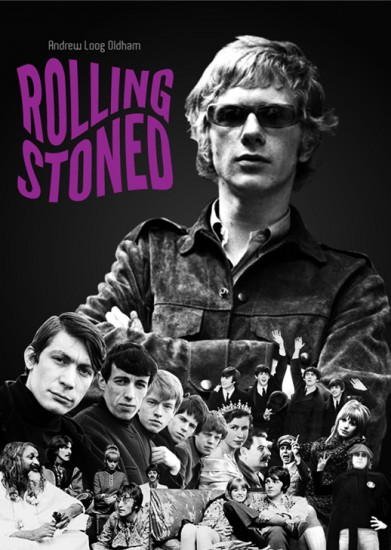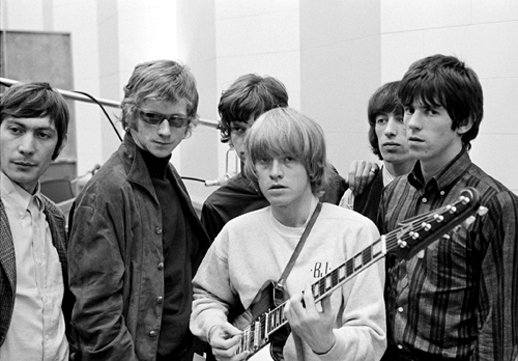
Robin, Andrew and myself talk often on here about the patron saints of Caught by the River: Roger Deakin, a man whose natural curiosity and spirit of adventure brought his words to life and added something new to ours, and Chris Yates, whose poetry of the riverbank has taught us how to read water and dress appropriately for the occasion. If what they each share isn’t immediately obvious, a few minutes with their legacy is enough to reveal them as single-minded visionaries; each with a distinctive, inspirational style and passion.
Today, we are honoured to be running something by a gentleman that I have felt certain has been looking over me on several occasions in my life. I guess that makes him a saint of sorts but he is definitely one of the most qualified at recognising a sinner. The author is Andrew Loog Oldham, a man most definitely distinctive, inspirational, stylish and passionate. He made things happen to music in the sixties that made things happen for people like us a generation later. Ad infinitum.
As a teenager in the late 1950’s and early ‘60s, informed by French celluloid and American vinyl he became one of the first hip hustlers of the “all change” generation. The first time I ever read his words they were on the back of a record sleeve; “The ROLLING STONES are more than just a group – they are a way of life”. They were Andrew’s group. That’s what he started. He has written of his exploits in two books, Stoned and 2Stoned and now he’s put them together, taken out most all other voices, added a couple of new chapters and put it into the digital domain as an ebook.
Today we run the first part of the new introduction, next week, along with a Q&A with Bob Stanley, we run the rest…

Rolling Stoned. By Andrew Loog Oldham.
INTRODUCTION
It was an English summer, a few years ago. Ex-Rolling Stones bass player Bill Wyman and his lovely Suzanne invited Esther, myself, and an old, old friend, interior decorator Nicky Haslam, out to his Essex mansion for Sunday lunch. Bill and I had been having dinner on occasion the past few of those years, something we had not managed to do the previous forty.
I had never been to this domain, although I did recall Bill buying it in 1968. We had a delightful meal, which was followed by a scrumptious stroll around Bill’s grounds, munching on crab apples, and enjoying a perfect English day, the light, the company, and the view.
I had not seen Nicky since the mid-sixties, when he resided in New York and I wished I did. America had had its president slain, not an uncommon occurrence in historical fact, and had had its music industry assassinated the very next year by the British Invasion, led by the Beatles, Herman’s Hermits, and the Dave Clark Five. We, the Stones and I, had taken a little longer to find our vinyl legs, arriving later and, save the very idea of the Beatles, staying longer. But, unlike the Beatles, it could be said that the Rolling Stones were merely born in England. They were made in America.
Bill explained to Nicky how he came upon the house and grounds, and how, had he more than a thousand pounds in his bank account in 1968, he could have bought more than twice the land he ended up with. What he ended up with is, of course, not bad at all for a boy from Penge; but a thousand pounds in the bank really does not seem enough for membership in the band that road manager Sam Cutler was already announcing as: “Ladies and Gentlemen, the greatest rock and roll band ever!” or whatever the phrase was. But, as Bill explained, “That’s how little money we really had.” He turned to me: “You remember how our money was tied up in loans with Allen Klein.”
After nosh, I ask Bill, “Has Mick ever been here?”
Bill looks at me in the old way, “Naaa, he’s never invited me to his place, why should I invite him to mine?” So ran the social motor of the world’s greatest rock ‘n’ roll band …
Bill was not a Stone any more, and I have not seen the Stones for some years either; the last time was in Seattle in 2005. My younger son, Max, was attending college in Santa Monica, and I was in Vancouver, where Esther and I had a second home. We planned to drive down, see the Stones in Seattle, then drive him in a fresh set of wheels to Los Angeles and back to school. My older boy, Sean, could not make it, being at a Yoga retreat in Spain.
The Rolling Stones were playing the Key Arena on Sunday, October 30. Paul McCartney would play there the following Thursday, November 3.
We checked into the Hotel Andra on 4th and, after a snack, strolled down toward the downtown area and the Four Seasons Hotel, where the boys were. Compared to my first visit, a decade earlier, I found I now liked Seattle. I liked the drizzle, the pace, and the people – and it had, after all, been the place where, a dozen years before, I began this triography.
We announced ourselves. Jagger’s personal assistant, Tony King, came down a few minutes later and joined us in the elevator. It was four o’clock and Charlie Watts had invited us to tea.
“Well, Andrew,” said Tony in the elevator.
“Well, Tony,” I replied.
“Well, they are … I mean … just like the royal family now, aren’t they? I mean, they just are …”
“And you’re the fuckin’ lady-in-waiting,” I thought, “the sycophantic diaper changer to the stars, or one of them.” I bit my lip. How could I respond? One, Max was watching me for a reaction; after all, this was a comparison that neither of us had heard. Two, Tony and I were supposed to be pals. I wasn’t sure whether to laugh or cry. They may be the biggest, longest lasting, very best, incredibly invincible, pragmatic, truly real, and most profitable rock ‘n’ roll band on earth, but royalty? I had hoped that Tony had been pulling my leg, but the stretched, Bette Davis eyes and the “I-have-said-the-right-thing” expression on his still very good looking face did not say, “I was joking.” Rather, they invited, “Well, dear. I’m waiting for your reply.”
I guess that’s what ladies-in-waiting do, they wait. I must ask Nicky Haslam the next time I’m in London, I thought, he would surely know.
I cannot remember how I replied, save that it was a sensible cop-out. But I know I never mentioned Dorian Gray.
The last couple of times we had seen the Stones, they were mixed to magnificent. In Glasgow on the previous tour, they played an 8000-seater of a corrugated roof shed, the Scottish Exhibition and Conference Centre, appallingly set up, perhaps, for Mariah Carey, who would play the place the end of the next month. It was a stand-up audience, not meaning comedians, although in Glasgow there are always more than a few; but 7000 of the 8000 were standing as if in a ballroom, while the other grand were very grand, bummed into seats that clung and slinked around three of the four walls, priced between 150 quid and a lot more.
Watching the crowd from the rollerballed, five-deep, seating pad resembled a rock ‘n’ toll Gladiator with the Stones as Christians and lions and we, hoi polloi, watching. It should have been on ice, it would have made much more sense.
The sound was atrocious; well, perhaps that’s a bit unfair … let’s just say cavernous. The Stones spent most of the show warming up. It was all very impersonal; there was not much, if any at all, of a connection between the Glimmer Twins, at least not for public show. Mick danced, pranced, oyed, yobbed, and souled his amazing self around the room. Keith enjoyed the fact that he was worshipped, and was much more choreographed – God help Pete Townshend if he tried the Keith movements now! Every few minutes or verses, he would spread himself in front of his fans; it seemed that on this nice, warm, Glasgow evening that Mick had a crowd and Keith had fans. Or, as Johnny Marr puts it, “The Rolling Stones are Keith Richards’s band and Mick Jagger’s business.”
I had no time for their new bass player. Perhaps Keith remembers Cuddly Dudley Heslop on Jack Good’s TV shows. That’s who he reminds me of, except with the addition of “I’ve played with Sting” and all those little jazzified frills. Of course, it’s not his fault; he could be great, but he cannot win me because, without Bill Wyman, the Stones are always a little less than a band.
Nor have I ever liked a Stones night much when Ronnie Wood overplays to the crowd. He’s a second banana at best, and a slippery one at that. Whenever I notice the talented little git playing out and showing off, it usually means that Mick and Keith are doing less, and it shows. Or perhaps – and if I do it’s my fault – I see a ghost upon the stage, the ghost of Brian Jones when the playing was not enough for him, when Mick was too much for him, and he just had to flash the falsest smile this side of Sharon Osbourne, play out, and show off, to make me cringe.
Ronnie played well in Glasgow, but Keith was no more than good, which remains above the very best of the rest of the anchors and guitarists in our world. Charlie was immaculate; he has managed to maintain the incredible gift that he has always displayed, coming under “I play as I go.”
The keyboard player got on my nerves. He always has. I realize that he’s there to fill in the spaces which are bound to appear on a five-year tour, but does he have to prance around like someone whom Journey or Heart let go? The horns are lucky the Stones employ them, or else they’d be playing cruise ships, which is exactly the way the night in Glasgow felt: one big fucking luxury liner looking for a port. It did not find it that often, as shit doth happen. It was less Titanic and more The Poseidon Adventure – all really rather weird. The core Stones should really think about getting rid of the peripheral band.
In front of me, there sat a forty-something, Simpsonesque, short-sleeved, perfect child-molester look-alike: groomed and clean, outdoor arms, checked button-down casual shirt, and those awful beige trousers that people with awful bums insist on wearing along with their battleship shoes. He could have been a schoolteacher or a surveyor, I thought, as a lack of obvious energy for a song or two allowed me the time to study and criticize him.
I’m glad I did. He had remained quiet, pensive, his only movement a self-fondling of the well-built arms. Then, all of a sudden, my fair perv leapt up from his seat, grabbed the railing in front of him, and yelled – louder than the Liza Minnelli take on “You Can’t Always Get What You Want” that was coming, well, slogging, from the stage – “Mick, I love you; you know I always have!”
I looked at Max and Esther, then at Sean, who had joined us for this Glasgow brawl. I guess I was wrong; perhaps it’s Keith who has the crowd and Mick who has his fans.